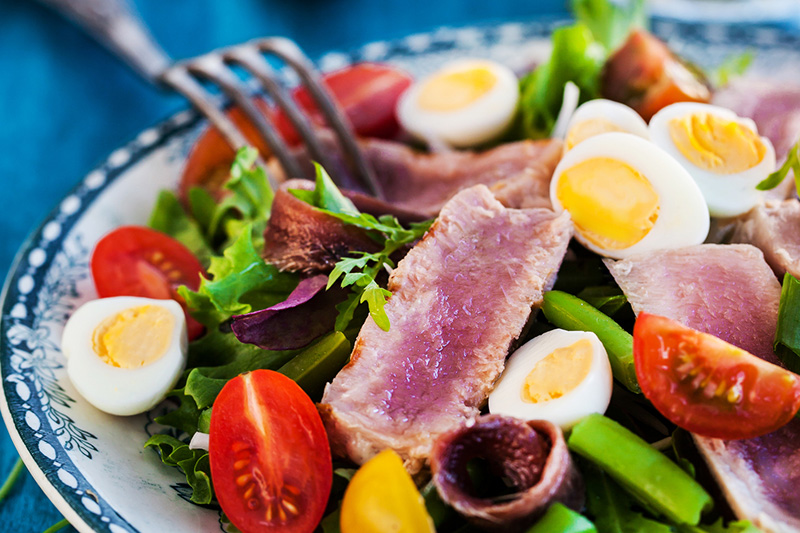More Health and Nutrition Bites
Related
Can I continue to eat a vegetarian diet during pregnancy?
Yes, you can. Here are some guidelines.
On cholesterol-lowering medication? Diet can still help
Back in 2006 I wrote about a professor I had in medical school who said, "I don't care about my diet, I'll just take Zocor or another cholesterol lowering medication and keep eating my thick, juicy steaks." He believed that taking medication was just as good as eating healthy.
Are Vegetarians Less Likely to be Overweight?
After following my columns on Nutrition and Weight Loss Myths for the last four weeks, one of my patients asked about being vegetarian. They questioned if there was really scientific evidence of better health among those who don't eat meat.
Health & Nutrition Bites
Get the latest health and diet news - along with what you can do about it - sent to your Inbox once a week. Get Dr. Gourmet's Health and Nutrition Bites sent to you via email. Sign up now!
Vegetarians Less Likely to Die from All Causes

A recent study funded by the National Cancer Institute found that vegetarians were 12% less likely than non-vegetarians to die from any cause. Sounds like you should quit eating meat right away, doesn’t it? Not necessarily.
The data comes from a long-term, large scale study known as the Adventist Health Study 2. These adult male and female Seventh-day Adventists were recruited between 2002 and 2007 and responded to detailed dietary questionnaires of over 200 food items at the start of the study, which is ongoing. For the purposes of this analysis (JAMA Intern Med 2013;173(13):1230-1238), the researchers excluded those under 25 years of age and those with a history of cancer or heart disease at the time of recruitment, leaving over 73,000 participants.
Rather than asking the participants to identify themselves as vegetarian (whether vegan, lacto-ovo, or other type of vegetarian), the researchers used their questionnaire responses to group the respondents into five dietary types:
Non-vegetarian;
Semi-vegetarian (ate meat of any kind once per week or less);
Pesco-vegetarian (ate fish once per month or more but no other meats);
Lacto-ovo vegetarian (ate eggs or dairy once per month or more, but not fish or meats);
Vegan (ate eggs/dairy, fish or meat less than once per month)
The researchers note that for some of their conclusions they grouped the four vegetarian diets into one, comparing all four of the vegetarian types as a group to the non-vegetarians. This is important because on the whole, vegetarians tended to be older and more educated, smoked and drank less, exercised more, and had lower Body Mass Indices than those who were non-vegetarians.
Over the 5 years of follow-up the researchers recorded the cause of death for all participants who died and compared their dietary pattern with those who did not die. It shouldn’t surprise you that after the researchers adjusted for the participants’ race, age, and gender, vegetarians of all types were 13% less likely to die from cardiovascular disease, 8% less likely to die from cancer, and 19% less likely to die from ischemic heart disease (which is caused by reduced blood flow to the heart due to blockage of the coronary arteries, aka poor cholesterol scores).
What’s interesting about this study comes out when you look closely at the comparisons between the various types of vegetarianism. The pesco-vegetarians actually reduced their risk of death from ischemic heart disease, cardiovascular disease, and all others causes except cancer more than the vegans!
While the vegans reduced their risk of death from all causes by 15%, the pesco-vegetarians reduced their risk by 19%. Similar results were found for cardiovascular disease: vegans had a reduced risk of 9% and the pesco-vegetarians: 20%. The most dramatic difference was for death from ischemic heart disease: 10% lower risk for vegans, 45% lower risk for pesco-vegetarians.
What this means for you
The Dr. Gourmet message is about eating great food that is great for you and doing so in a way that you can keep doing for the long term. Not everyone is cut out for a vegan lifestyle (or even a semi-vegetarian lifestyle). If you are and it’s working for you, great!
Today’s research shows that you don’t have to cut out all animal products to be eating healthy. For a diet that for most people is something they can live with for the long haul, the Mediterranean Diet, with more fish and less meat and red meat, is still the best diet and the one we have the most high-quality research on.
First posted: July 18, 2013
